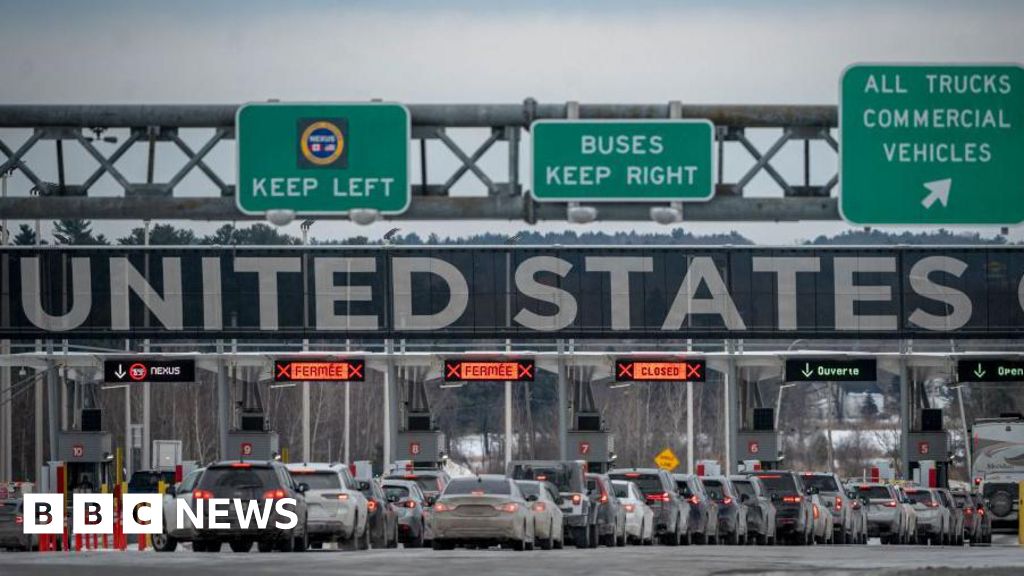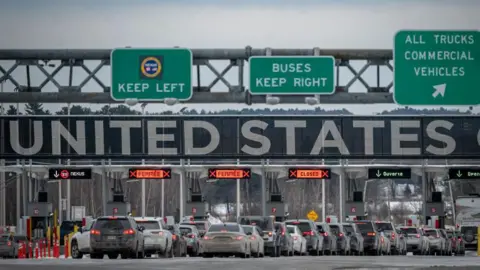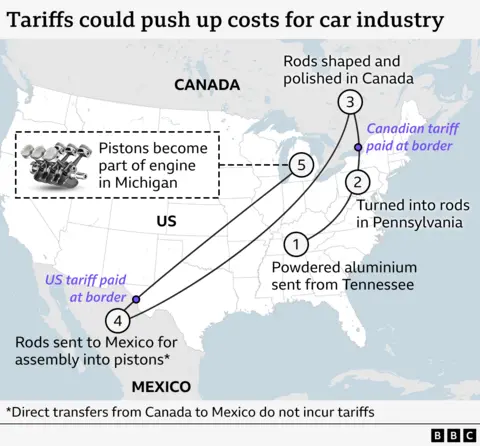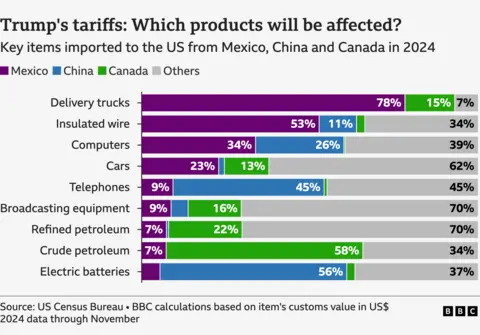What are tariffs, why is Trump using them, and will prices rise?

 Getty Images
Getty ImagesUS President Donald Trump said he plans to introduce 25% tariffs on all goods imported from the EU, claiming the bloc was created to “screw the United States”.
He has already announced a 25% charge on all steel and aluminium imports, and a 10% tax on products from China.
Proposed 25% tariffs on goods from Canada and Mexico are due to take effect on 4 March, although Trump has suggested this deadline could slip.
What are tariffs and how do they work?
Tariffs are taxes charged on goods imported from other countries.
The companies that bring the foreign goods into the country pay the tax to the government.
Typically, tariffs are a percentage of a product’s value. The 10% tariff on Chinese goods means a product worth $10 would have an additional $1 charge applied to it.
Firms may choose to pass on some or all of the cost of tariffs to customers.
Why is Trump using tariffs?
Tariffs are a central part of Trump’s economic plans. He promised to introduce import duties against some of America’s main trade partners during his election campaign.
He says tariffs will boost US manufacturing and protect jobs, as well as raising tax revenue and growing the economy.
The White House said said the president was also “taking bold action to hold Mexico, Canada, and China accountable to their promises of halting illegal immigration and stopping poisonous fentanyl and other drugs from flowing into our country.”
Fentanyl is linked to tens of thousands of overdose deaths in the US each year.
The Trump administration says the chemicals come from China, while Mexican gangs supply it illegally and run fentanyl labs in Canada. Canadian Prime Minister Justin Trudeau said his country was responsible for less than 1% of fentanyl entering the US.
How will the steel and aluminum tariffs work?
Canada also provided more than 50% of the aluminium imported into the US in 2024.
Shares of US steelmakers rose following the announcement. However, American companies which use steel and aluminium to make products have warned the tariffs could put their prices up.
The Canadian government said the tariffs were “totally unjustified” and vowed swift retaliation.
Trump previously announced tariffs of 25% on steel and 15% on aluminium in 2018, during his first term as president. However, he subsequently negotiated exceptions for many countries including Australia, Canada and Mexico.
Despite the exemptions, tariffs raised the average price of steel and aluminium in the US by 2.4% and 1.6% respectively, according to the US International Trade Commission.
What is happening with tariffs against China?
What is happening with tariffs against Canada and Mexico?
A proposed tariff of 25% on all goods entering from Canada was also due to begin on 4 February. However, this was delayed for a month.
Canada also paused its own retaliatory tariff of 25% on 155bn Canadian dollars’ worth ($107bn; £86bn) of US imports.
PM Trudeau said Canada was implementing a “$1.3bn border plan” to add “new choppers, technology and personnel to border,” as well as “increased resources to stop the flow of fentanyl”. Much of the border security plan had already been announced.
Trump said the delay would allow the US to see “whether or not a final economic deal with Canada” could be reached.
The proposed 25% tariffs against Mexico have also been delayed, as have new measures by Mexico against US goods.
Mexican President Claudia Sheinbaum agreed to send 10,000 members of the National Guard to the US-Mexican border to “prevent the trafficking of drugs, in particular fentanyl”.
Sheinbaum said the US had in turn agreed to increase measures to prevent the trafficking of high-powered US weapons into Mexico.
Speaking to reporters after his first cabinet meeting on 26 February, Trump appeared to suggest that the tariffs on Mexican and Canadian goods might be postponed until 2 April.
However the White House later confirmed the 4 March deadline was still in place.
Which products will be affected and will prices increase?
All goods from China worth more than $800 are covered by the 10% tariff.
All steel imports from around the world face a 25% tax.
Economists warn that firms selling imported goods are likely to increase prices for US consumers, to cover the cost of the duty.
If the measures against Mexican and Canadian imports go ahead, items they produce are also expected to become more expensive.
Car manufacturing could be hit extremely hard. Vehicle parts cross the US, Mexican and Canadian borders multiple times before a vehicle is completely assembled.
The average US car price could increase by $3,000 because of the import taxes, financial analyst TD Economics suggested.

Other goods from Mexico which could be affected include fruit, vegetables, spirits and beer.
In addition to steel, Canadian goods such as timber, grains and potatoes are also likely to get more expensive.
Canadian energy would face a 10% tariff instead of 25%.

US tariffs on imported washing machines between 2018 and 2023 increased the price of laundry equipment by 34%, according to official statistics. Prices fell once the tariffs expired.
Some experts suggest that Trump’s new round of tariffs could prompt a wider trade war which could put prices up more generally.
Capitol Economics said the annual rate of US inflation could increase from 2.9% to as high as 4%.
Will the UK and Europe have to pay tariffs?
Trump previously told the BBC the UK was “out of line”, but suggested a solution could be “worked out“.
The UK exports pharmaceutical products, cars and scientific instruments to the US.
Business secretary Jonathan Reynolds said the UK should be excluded from tariffs because it buys more from the US than it sells there.
Speaking in Parliament after the announcement of the steel and aluminium tariffs, Trade Minister Douglas Alexander said the UK would not have “a knee-jerk reaction” but “a cool and clear-headed” response.
At the 26 February cabinet meeting, Trump said he would announce sanctions on EU goods “very soon”.
“It’ll be 25% generally speaking and that will be on cars and all other things,” he added.
The US had a trade deficit of $213bn with the EU in 2024 – something Trump previously described as “an atrocity”.
In response, the European Commission said it would react “firmly and immediately against unjustified tariffs”.
US companies Harley Davidson, which manufactures motorcycles, and whiskey distilleries such as Jack Daniel’s have previously faced EU tariffs.
Related
What’s at stake for American culture with Trump’s Kennedy Center…
In her two decades as a human rights lawyer, working on issues in more than 25 countries, Hadar Harris says she is alarmed by what she's witnessing on U.S. soil
Denmark lost 52 soldiers fighting alongside the US. Now it…
Nick BeakeEurope correspondentBBCAll his adult life, Colonel Soren Knudsen stepped forward when his country called. And when its allies did.He fought alongside
As Trump upends foreign policy, Berkeley scholar sees irreparable damage…
Last week’s Oval Office blowup with Ukrainian President Volodymyr Zelensky exemplified what many foreign policy experts have long feared: that th
Trump creates a task force for the North American 2026…
President Donald Trump creates a task force to prepare for the 2026 W












